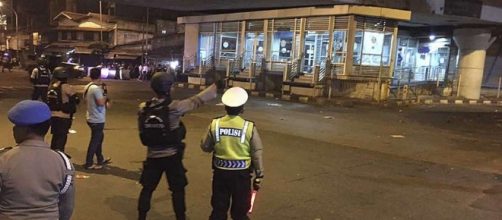In the densely populated city of Jakarta, the capital of Indonesia, a suicide bombing took place at a bus stop which seemed to be targeting Indonesian policemen. Transjakarta, an Indonesian company that runs local bus services, tweeted shortly after the attack, confirming it was indeed a suicide bombing.
Transjakarta: Explosions from Suicide Bombing https://t.co/SUNctvXcnL #BreakingNews pic.twitter.com/bZ7P9ylzEe
— NetralEnglish (@netralenglish) May 24, 2017
As of now, the only confirmed deaths include a policeman and the suicide bomber. Nine other people were injured from the blasts, including four other officers.
According to Indonesian police spokesman Colonel Argo Yuwono, the area will remain sealed off for investigation for the time being.
Police say suspected suicide bomb blast near bus terminal in Indonesia kills policeman, injures four other officers. https://t.co/n5D1PSOr2T
— The Associated Press (@AP) May 24, 2017
Terrorism in Indonesia
While there has yet to be any confirmation as to the identity of the suicide bomber, or the motive behind it, the attack certainly follows the recent trend of Islamic militant attacks on police officers in Indonesia. During the early 2000’s, the Islamic extremist group Jemaah Islamiyah, an al-Qaeda affiliate, had been responsible for several attacks in Indonesia, primarily targeting western tourists as well as local civilians.
Because of these attacks, many countries issued travel warnings which severely damaged Indonesia’s tourism industry as well as foreign investment prospects.
However, due to the Indonesian police crackdown on many of Jemaah Islamiyah’s terrorist cells, the terror group has shifted towards targeting police officers. Since 2011, there have been several terrorist attacks specifically targeted at Indonesian police, although the attacks were not as large-scale or organized as previous attacks thanks to the capturing and killing of most of Jemaah Islamiyah’s key members.
It should also be noted that other groups not linked to Islamic extremism have also been targeting Indonesian authorities recently.
Specifically in Papua, the largest and easternmost province of Indonesia, in which the separatist group known as Organisasi Papua Merdeka has been responsible for several attacks on police officers in the region.
Southeast Asia in general has been dealing with Islamic militants for quite some time now. The last couple of days especially have been a worrisome time in which Philippine President Rodrigo Duterte recently declared martial law in the southern Philippines after a major gun battle between police and ISIS-affiliated Islamic extremists took place in Mindanao. With the highest population of Muslims in the world, Southeast Asia has often been overlooked by the international community as one of the major hotbeds of Islamic extremism in the world.


